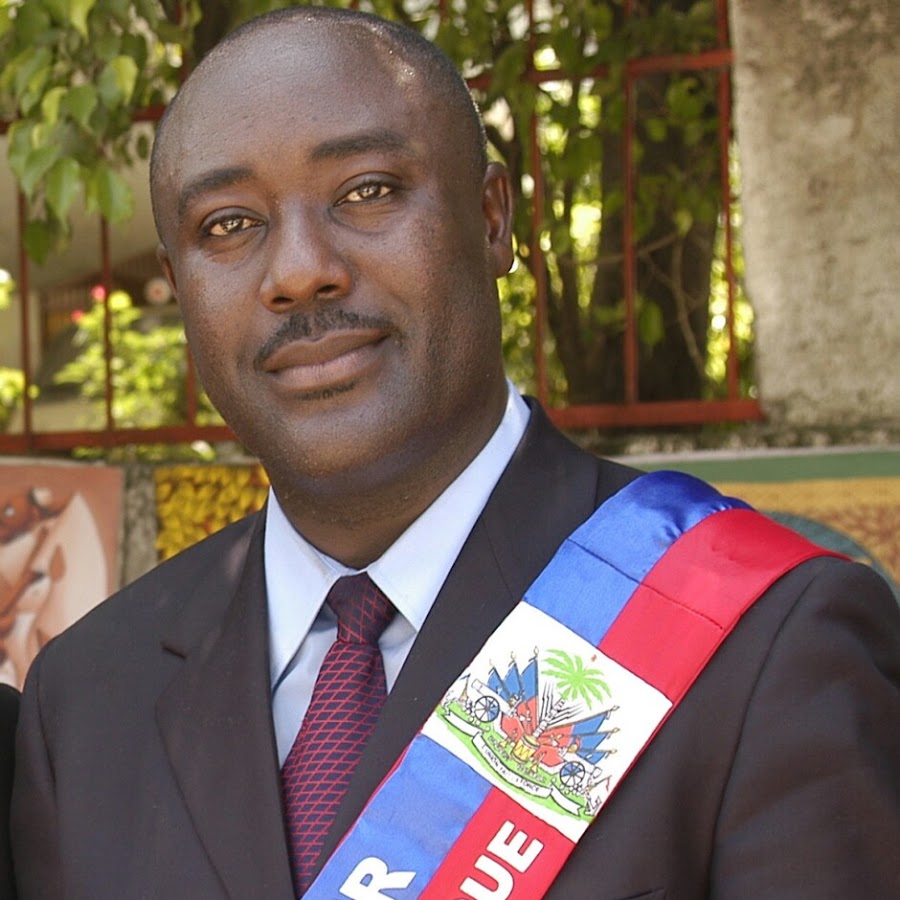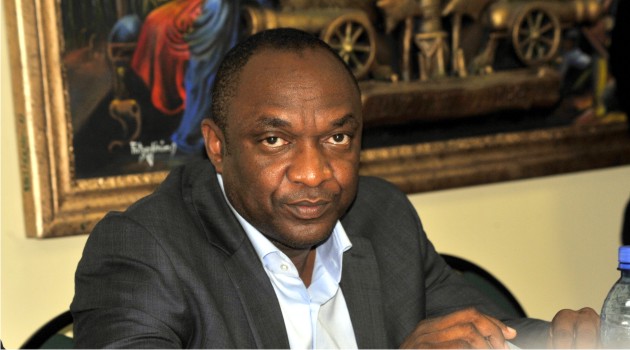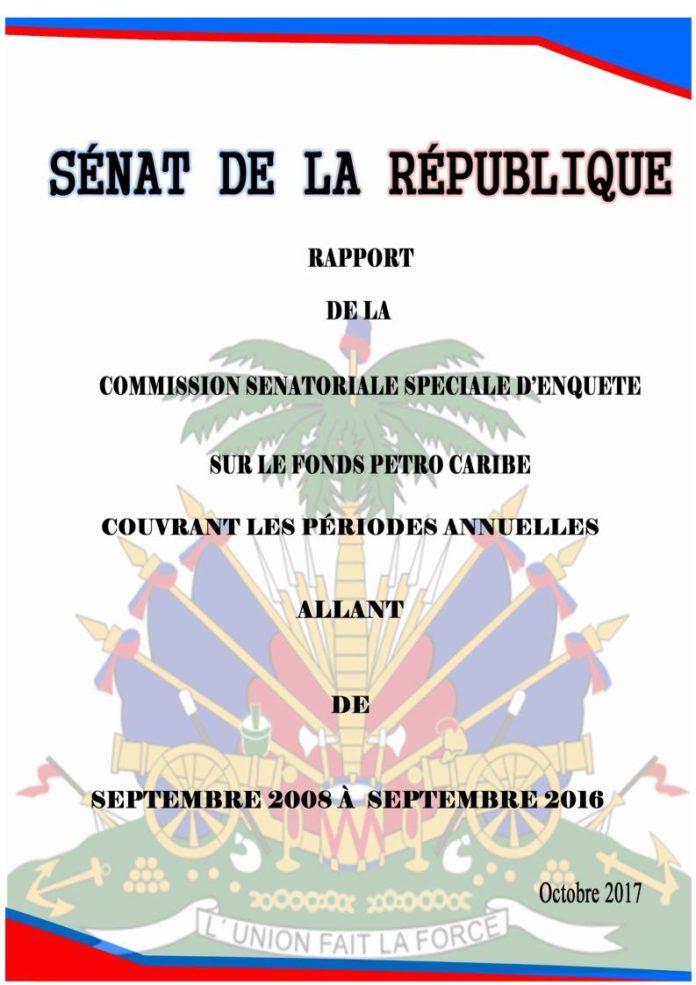This past week, a second Senate investigative commission released a 656-page report on government corruption, incompetence, and mismanagement in spending close to $2 billion over eight years from the PetroCaribe fund, which is filled by deferred payments for Venezuelan petroleum.
In August 2016, a first Haitian Senate commission, headed by the infamously corrupt Sen. Youri Latortue, produced an initial report which was derided as incomplete, misleading, and duplicitous.
So a second Senate commission headed by Sen. Evallière Beauplan was formed. Its four other members were Senators Nenel Cassy, Antonio Cheramy (also known as “Don Kato”), Richard Lenine Hervé Fourcand, and Onondieu Louis.
Sen. Beauplan said that there was “more work to do” in investigating the PetroCaribe fund, but the report, after 18 months of work on it, was released now due to the public’s impatience.
The PetroCaribe agreement was signed between Haiti and Venezuela in 2007 despite fierce U.S. sabotage attempts. Under the Petrocaribe accord, Venezuela provides Haiti with all the oil it needs, while Haiti pays for only 60% up front. The remaining 40% of gas revenues goes into the Petrocaribe fund, which is to be paid over 25 years at 1% interest. The fund was aimed at providing capital for Haiti to invest in development projects to “aid the Haitian people.”
One of the report’s most shocking revelations: Haiti owed cash-strapped Venezuela about one year of back payments totaling over $80 million as of September 2016. It may well owe more now, over one year later.
Haiti Liberté has posted a link to the full report in French on its website. We will be analyzing the report in the weeks ahead.
This week we provide an English translation of the report’s Executive Summary and Foreword.
I- Executive Summary
During time period from September 2008 to September 2016 covered by the Commission’s mandate, there were two successive [Haitian] heads of state: René Garcia Préval and Joseph Michel Martelly. Under the administrations of these two heads of state, five governments headed by five prime ministers, were installed.
To respond to natural disasters – storms, hurricanes, and the January 12, 2010 earthquake – two emergency laws were passed followed by three Presidential Orders to establish a state of emergency throughout the national territory and 13 resolutions for programs and projects funded through the PetroCaribe fund totaling 110,190,864,999 gourdes. [US$1,732,084,700].
The results, however, were very unsatisfactory and gave rise to worrying doubts about the PetroCaribe fund’s management.
Therefore, three years after the first disbursements ordered by the four first resolutions, amounting to US $545,740,829, Prime Minister Gary Conille called for a financial audit in 2011. The results added to the financial scandal which erupted during Dominican Senator Bautista’s trial [for corruption] and President Martelly’s statement during a visit to the city of Les Cayes, announcing that the Haitian state coffers were empty, not to mention the various denunciations of corruption in both the national and international spoken and written press, which generated even more doubt and suspicion of mismanagement.

Without any light being shed on these suspicions, from August 2011 to January 2016, the governments of Prime Ministers [Garry] Conille, [Laurent] Lamothe, and [Evans] Paul, issued nine more resolutions, ordering disbursements totaling US $1,396,925,569.
Thus, [in 2017] a first [Senate] commission was assembled… called the “Ethics and Anti-Corruption Commission“, chaired by the Honorable Senator Youri Latortue, but the results prompted a new inquiry. A second Commission was therefore put together. It was called this time the “Special Senatorial Commission of Inquiry into the PetroCaribe Fund” chaired by the Honorable Senator Evallière Beauplan who, in the interests of balance, turned to other experts by hiring a firm of accountants.
The audit covers the period from September 2008 to September 2016 and reviews the financial statements of the PetroCaribe Fund prepared by BMPAD [the Monetization Office of Development Assistance Programs] and submitted to auditors for review.
This résumé outlines the most important anomalies and irregularities. They are:
- The PetroCaribe fund’s financial statements covering the period from September 2008 to September 2016 do not reflect the fund’s financial state. In fact, they simply restate over several periods a total net amount of 57,231,022,647 [US $899,611,583].
- Accounts with variable market value are not properly valued. BMPAD used different valuation rates as of Sep. 30, 2016, ranging from 70.35 to 107.35 gourdes for one US dollar, while the reference rate provided by the BRH was 65.5368 for one U.S. dollar.
- The fund’s resources used by the Haitian state are capitalized. According to the BMPAD, these guidelines emanate from the Ministry of Economy and Finance, without providing us with more details. The amount appearing on the fund’s books as of Sep. 30, 2016 is: HTG 110,190,864,999 [US$1,732,084,700].
- The time required to collect accounts receivable from the sale of petroleum products to local companies shows that the payment terms are not respected. As an example, SOGENER [a private electric company] owes the PetroCaribe fund an amount of US$173,984,647 as of Sep. 30, 2016.
- As for EDH [Electricité d’Haïti], the amount of its debt accrued since May 24, 2008 totals on Sep. 30, 2016 a sum of US$437,346,841.
- BMPAD has not paid the cash portion [of the PetroCaribe agreement], i.e. the value to be paid to the PDVSA [the state-owned Petroleum of Venezuela] upon receipt of each shipment. The last payment dates back to March 2016 and is delayed by 11 installments as of Sep. 30, 2016 totaling US $80,633,024 or its local currency equivalent of 5,284,430,367 gourdes, established at the rate of 65.5368 per U.S. dollar.
- BMPAD draws resources from the fund for the management services provided. There is no mechanism defining how to calculate and pay for these services. This amount varies from one year to the next.
For example: 2016 2015
BMPAD Budget Funding HTG 413,859,000 131,328,000
- For the 2016 annual period, the fund’s financial statements show a spot order penalty in the amount of 18,523,092 gourdes. However, in management, any penalty arises from non-compliance with a standard or any commitment reflecting an administrative failure, while, the fund’s participation in financing the BMPAD budget has tripled from 131,328,000 to 413,859,000 gourdes.
- BMPAD manages projects whose resources are drawn from the PetroCaribe fund. This function is incompatible with its mission.
- The Bolivarian Government, following the earthquake of Jan. 12, 2010, canceled Haiti’s debt which at that time amounted to US $396,073,224 or its local currency equivalent of 25,957,371,667 gourdes. Debt cancellation was not provided for in the Agreement. This decision of the Government of the Bolivarian Republic was to result in a corresponding cash flow for the Haitian State. Given that no management mechanism was put in place for the fund’s use except by resolutions, the amount of the debt’s cancellation should be specified by a resolution of the Council of Ministers allowing thus the retribution of these funds to the Haitian State.
As for the audit of the financial resources generated by the PetroCaribe fund used to finance the programs and projects through the 13 resolutions adopted from Sep. 20, 2008 to Jan. 6, 2016, they were each subject to a specific audit identifying the resources allocated, disbursements made, compliance with the rules governing the awarding of contracts, the conditions of eligibility of the successful tenderer, the nature of the contract, the related disbursements, and the physical evaluation of certain works selected with the following criteria:
- Nature of the work
- Contract amount
- Departmental areas
We came to a conclusion about each resolution. Our investigation’s results are also summarized:
1- The Certificate of no objection by the CNMP [National Commission of Public Contracts] in the majority of the contracts received from beneficiary institutions and analyzed was not obtained;
2- The approval of the CSC /CA [Superior Court of Accounts and Administrative Litigation] is sometimes mentioned in some contracts, but does not exist in others;
3- Some contracts do not have a signature date;
4- Eligibility documents often do not comply;
5- The deadlines for carrying out the work are not always respected;
6- Late penalties are not charged;
7- The 2% levies on behalf of the DGI [Tax Department] are sometimes made without any document certifying their payments or their return to the DGI. These 2% levies were not made in the majority of contracts;
8- Clear differences are noted in the cost of one kilometer of road between two contractors operating in the same sector of activity and for the same period
II- Foreword
With the mandate it had clearly received from the Assembly of Senators of the Republic, the Special Senatorial Commission of Inquiry (CSSE) charged with deepening the investigative report of the “Ethics and Anti-Corruption Commission” on the management of the PetroCaribe fund, undertaken, based on an approach based on the analysis of accounting, financial, legal and technical, on a set of hearings, site visits, evaluation of the report of the Senate Ethics and Anti-Corruption Committee to establish and/or re-establish the facts and bring out the truth about the management of the PetroCaribe fund in the framework of the execution of programs related to this fund.

The mission entrusted to the CSSE was initially a response by the Office of the Senate of the Republic to the skepticism aroused by the report of the first “Ethics and Anti-corruption Commission” of the upper house and was also part of a logic of justice due to the nation by Haitian authorities with regard to legitimate questions about the expenses drawn from PetroCaribe fund, which was originally intended to improve the Haitian population’s living conditions.
PetroCaribe, in its essence, was a source of hope. An agreement between the countries of the Caribbean and Venezuela, it offered great opportunities to these countries, including Haiti, by allowing them to buy oil at preferential prices. Almost a favored beneficiary of this agreement, Haiti has for a long time benefitted from the advantages which were offered to it but could not exploit them to the maximum.
Facing a real deficit of credibility, the Haitian state, through its rulers, found itself on the hot-seat as suspicions grew about the management of the PetroCaribe program because of the widening the gap between the benefits to the people in relation to those of the holders of political power. Always looking for signs of a better tomorrow, citizens were disappointed by the rather mixed results of the PetroCaribe program. Once again the failing structures of the Haitian administration have been counterproductive and have never been able to achieve the desired and expected performance. Corruption, incompetence, nepotism, letting things go, a lack of professionalism that characterized the implementation of the projects caught the attention of the observers and analysts of the country who were quick to sound the alarm and alert the public opinion on what appeared to be real bankruptcy.
Therefore, the Senate of the Republic had to react. Co-holder of national sovereignty but still a direct representative of the population, it was its mandate to get involved in what had become a state matter and work to answer the many questions that held the public breathless.
The Senate therefore set up a Commission whose mission was to shed light on the way in which the PetroCaribe fund was managed; this commission, originally called the “Ethics and Anti-Corruption Commission,” was going quickly and resolutely to get to work and provide an initial response. But falling short of expectations, the report drawn up and presented by this Commission was disputed and met with skepticism. It was therefore necessary for the Senate of the Republic to react on the basis of this criticism and to meet expectations by taking into consideration the reproaches leveled against the [first] report. Thus, a second Commission was set up by the Senate of the Republic under the name of the “Special Senatorial Commission of Inquiry.”
This new Commission had to succeed. Public opinion was no longer inclined to tolerance, nor to procrastination. Building on the work of the previous commission, the newly born commission set immediately to work, drawing inspiration from its predecessor’s work and innovating with a more technical approach based on a financial and accounting audit of the operations which were carried out using money from the PetroCaribe fund. After evaluating the first survey’s results, the “Special Senatorial Commission of Inquiry” resumed the investigation by deepening its review of previously collected data and carrying out new analyses of the specific matters to establish a picture of what happened that is both comparative and recaps, thus arriving at a conclusion closest to the truth.
Translation from French by Kim Ives/Haïti Liberté











